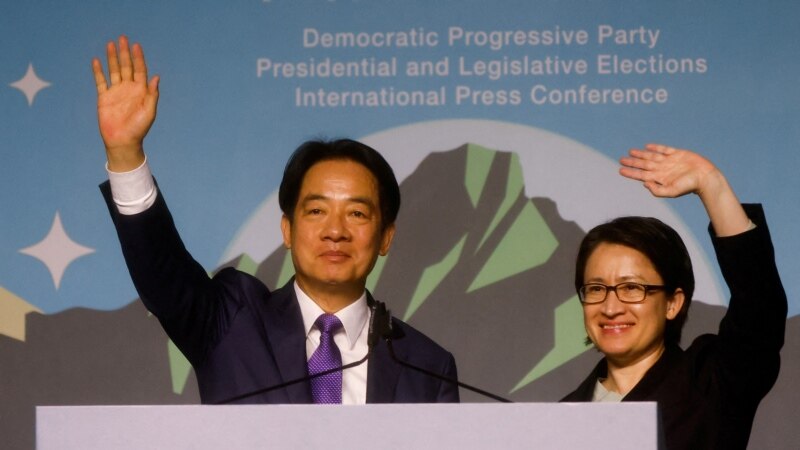Taiwan’s vice-president-elect, Hsiao, last week concluded a whirlwind diplomatic tour of Europe that saw her stop in three countries and Brussels and meet dozens of politicians, sparking concern in Beijing.
Analysts and some in attendance said the visit was an example of the high-level contacts Siu hopes to continue after he is formally sworn in with President-elect Lai Ching-te in May.
Mr Xiao met with parliamentary leaders from the Czech Republic, Poland and Lithuania. She has also been in contact with more than 30 members of the European Parliament in Brussels, including Othmar Karas, the first vice-president of the European Parliament.
Hsiao emphasized Taipei’s “democratic alliance with European countries,” according to Taiwan’s Ministry of Foreign Affairs. She also urged the EU to sign an economic partnership agreement with Taiwan to “demonstrate its commitment to safeguarding regional prosperity.”
The Ministry of Foreign Affairs stated that her visit will help the EU understand Taiwan’s commitment to “maintaining peace and stability across the Taiwan Strait” and expand bilateral cooperation in various fields.
Some people who attended the event with Hsiao said she also reiterated Taipei’s commitment to supporting Ukraine, a priority on the agenda of many Central and Eastern European countries.
Self introduction
Jakub Janda, director of the Center for European Security Policy Values in Prague, told VOA by phone that the meeting in Prague “was an opportunity for Xiao to introduce himself to Czech politicians.”
Janda said he attended a reception organized by Milos Vystrcil, the president of the Czech Senate, and that Mr. Xiao spent about an hour and a half “meeting with politicians one by one.” “Her trip shows that the incoming Taiwan government wants to maintain high-level contacts with Central and Eastern European countries,” he said.
In Lithuania, Xiao met with members of different political parties, including two candidates for the upcoming presidential election, and gave a speech at the Institute of International Relations and Political Science at the University of Vilnius in Lithuania.
Marius Laurinavicius, a Lithuanian national security expert who attended the closed-door meeting with Xiao, said her meetings with Lithuania’s ruling bloc and an opposition party suggested some opposition parties may have adjusted their views on the Baltic state’s relations with Taiwan .
“Xiao’s visit is a good sign for both countries because it shows that some political parties may have changed their stance on cooperation between Lithuania and Taiwan,” he said in a telephone interview with VOA.
In Brussels, some European lawmakers believe Hsiao’s visit will help raise awareness of Taiwan in Europe ahead of European Parliament elections.
“Based on current election polls, the European Parliament will have a significantly larger right-wing bloc in the new term; MEP Engin Eroglu, who met Xiao in Brussels, told VOA in a written response “Unfortunately, there is a tendency in this camp to be less critical of China,” he said. “
He said Hsiao’s presence in Brussels could help remind European lawmakers of the threats Taiwan faces and the dramatic impact a Chinese invasion of the island could have on global trade.
Xiao’s trip to Europe comes less than two months after a new government led by the pro-sovereignty Democratic Progressive Party took office. China has long opposed Taiwan’s official interactions with other countries.
In response to her trip to the Czech Republic, China’s Foreign Ministry urged Prague to “take effective measures to eliminate the negative impact of the incident” and “strictly restrain certain politicians.”
Strengthen ties with Europe
Some analysts said Hsiao’s trip sent a signal to countries in the region that Europe remains important to Taiwan under the new administration.
“This visit is in line with Taiwan’s overall efforts to strengthen ties with Europe in recent years,” Zsuzsa Anna Ferenczy, an expert on EU-Taiwan relations at Taiwan’s National Dong Hwa University, told VOA by phone. She added Said that the country Xiao Xiang visited is a country that has become more confident in standing with Taiwan in recent years.
Since 2021, Taiwan has deepened its exchanges with Central and Eastern European countries and the Baltic countries, established a new representative office in Vilnius, established a US$82.58 billion Central and Eastern European investment fund, and signed an agreement to deepen economic and cultural exchanges.
play a role in administration
Some experts said that in addition to continuing to implement the foreign policy agenda set by the current administration, Xiao also used the European trip to “lay the foundation” for her role in the new administration.
Lev Nachman, a political scientist at Taiwan’s National Chengchi University, said Hsiao appears to want to continue to expand Taiwan’s international influence, just as she did when she served as Taiwan’s de facto ambassador to the United States.
“Xiao has more political and social capital internationally than other Taiwanese politicians, so I think she and the incoming administration hope this visit will ensure that that capital is not wasted,” Nachman said in a phone interview. “
Meanwhile, former Taiwanese president Ma Ying-jeou, from the pro-China Kuomintang party, is preparing to visit China next month. During that visit, Ma was widely expected to meet Chinese leader Xi Jinping in Beijing.
Nachman said Hsiao’s trip to Europe reflected the differences in the foreign policy agendas of Taiwan’s two major political parties.
“These visits further demonstrate the DPP’s approach to diversifying Taiwan’s foreign relations, while the Kuomintang prefers the approach of reconciliation with the People’s Republic of China,” he said.
Follow us on Google news ,Twitter , and Join Whatsapp Group of thelocalreport.in
